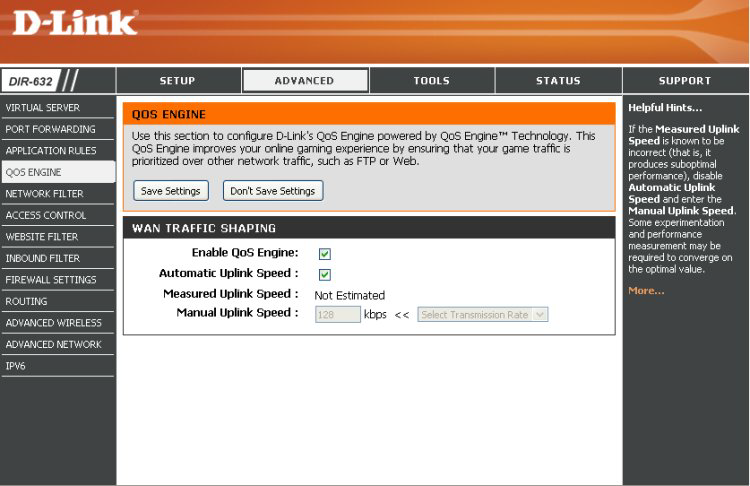Note: This FAQ uses the DIR-632 as an example. Your screen may look different than the image below.
QoS (Quality of Service) is designed to shape and prioritize your internet traffic among the computers on your LAN. This allows for an optimized internet experience.
To set up QoS in your router, use the following steps:
Step 1: Open a web browser and type the IP address of the DIR series router into the address bar (default is http://192.168.0.1).
Step 2: The default username is admin (all lower case) and the default password is blank (nothing). Click on OK.
Step 3: Click on the Advanced tab at the top and then click on QOS Engine on the left hand side.

WAN TRAFFIC SHAPING
- Enable QoS Engine: Enable this option for better performance and experience with online games and other interactive applications, such as VoIP.
- Automatic Uplink Speed: When enabled, this option causes the router to automatically measure the useful uplink bandwidth each time the WAN interface is re-established (after a reboot, for example).
- Measured Uplink Speed: This is the uplink speed measured when the WAN interface was last re-established. The value may be lower than that reported by your ISP as it does not include all of the network protocol overheads associated with your ISP's network. Typically, this figure will be between 87% and 91% of the stated uplink speed for xDSL connections and around 5 kbps lower for cable network connections.
- Manual Uplink Speed: If Automatic Uplink Speed is disabled, this option allows you to set the uplink speed manually. Uplink speed is the speed at which data can be transferred from the router to your ISP. This is determined by your ISP. ISPs often specify speed as a downlink/uplink pair; for example, 1.5Mbps/284kbps. For this example, you would enter "284". Alternatively you can test your uplink speed with a service such as www.dslreports.com. Note however that sites such as DSL Reports, because they do not consider as many network protocol overheads, will generally note speeds slightly lower than the Measured Uplink Speed or the ISP rated speed.
Step 4: Click Save Settings.